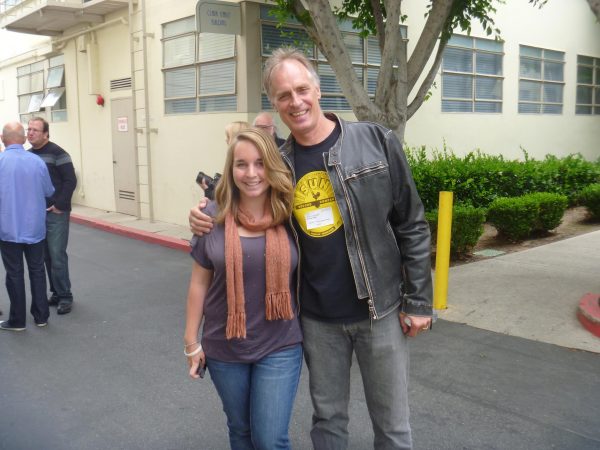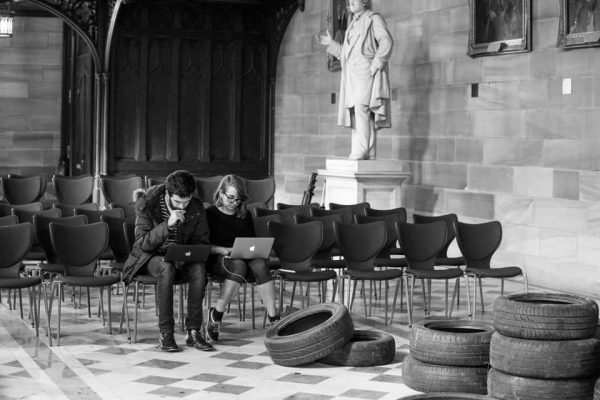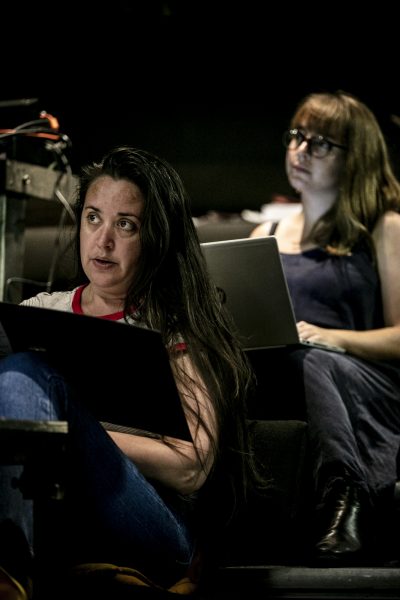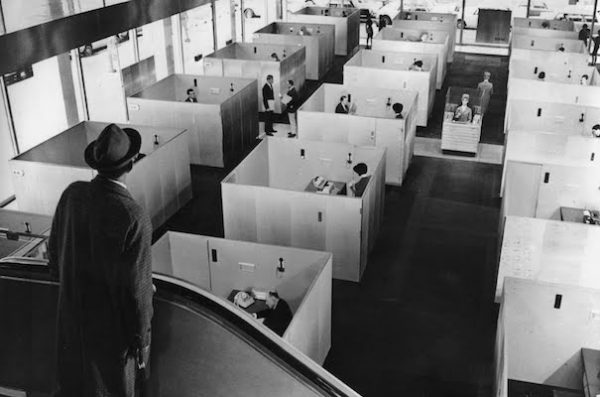07.10.21
Hi Grif-friends!
Just because our theatre’s dark, doesn’t mean the Griffs aren’t continuing to work hard behind the scenes! Welcome to our final edition of Staff Tutorials, which will hopefully bring you some joy and creative thinking while at home as we prepare to return to the theatre!
Here on the Griffin blog, we’ll share amazing creations/stories/ideas/hobbies from our staff as we keep ourselves busy during lockdown. Read on to learn about an extensive film list our Associate Producer, Planning Imogen Gardam has watched over lockdown, interviewed by Marketing Assistant Rebecca Abdel-Messih. Imogen’s top picks of where you can stream for free at the end!
Rebecca: Thank you so much for joining us this week Imogen! Tell me a bit of background that you have with film.
Imogen: Going way, way back, I was obsessed with film as a kid and particularly film music. Because I was a musician. As a kid, I played the flute, because I’m a very cool person! Music was really my way into film production and understanding how it worked. I got obsessed with the scores for films like The Lord of the Rings. When I was 16, I wrote a fan letter to a film composer that I really admired, Harry Gregson-Williams. The other films that were really important for me, musically, were the Narnia films, particularly The Lion, the Witch and the Wardrobe and Prince Caspian. Harry wrote these, like beautiful scores for them, and I loved them. And so when I was 16, sick one day at home, I wrote him a fan letter. I was probably like, super delirious. But he wrote back! We ended up corresponding a little bit, and he sent me example scores that were really important to him, like CDs and things. Then when I finished school, I asked if I could come and intern with him. So, I spent a couple of months of my gap year, interning in this music studio in LA, seeing how film gets put together from the perspective of the music department. The film that we were working on while I was there was called Cowboys and Aliens. It was really fun, genre-wise. We got to mash up sci-fi stuff with westerns!
 Pictured: Imogen and Keith Carradine during a scoring sessions for Cowboys and Aliens.
Pictured: Imogen and Keith Carradine during a scoring sessions for Cowboys and Aliens.
When I came back from my gap year, I started working at Hopscotch Features in distribution and production. That was kind of the job that I did through university, and I came to theatre from film. Then I got obsessed with live performance and kind of stayed in theatre. But film has always been a real love of mine. It was my major at university, and I’m currently doing a Masters of Research in Film Studies. So I came back to it academically.
Rebecca: Wow. That’s incredible. That is not where I thought this conversation was gonna go!
Imogen: Yeah, from a fan letter to an internship! I’m very lucky!
Rebecca: That’s such an amazing experience. Wow. Do you think you’re staying theatre? Because I can tell that you really have this passion for film. Even though you have an extensive knowledge of theatre. Your knowledge is impeccable of actors and plays etc. But you also have such a big background in film…
Imogen: I got into theatre at uni. I went to USyd and I was doing Media and Communications, which is kind of the closest thing I could find to film production there. They have a Film Studies department, but not a production school. So while I was there, I was working for Hopscotch. I was doing two days a week in this film office, reading scripts and watching films and doing coverage reports and things. And so I was looking to skill up in production, so I volunteered to stage manage the Arts Revue, which is a comedy sketch show. I had a really great time, and through the people that were doing that, I got pulled into the wormhole that is the Sydney University Dramatic Society (SUDS). It became my life for the rest of my university career. SUDS is the oldest student theatre in the country. They’ve been around for probably 130 years now. That was when I got sucked into theatre. Film is quite industrial, the way it’s put together. I would be working on films with Hopscotch but, you know, your contribution is very specific. It’s very small because it’s a process that brings together tons of people, and tons of different skills. So, I felt like I had ownership of this little part of the film process, which I loved, but at the same time, I was starting to make theatre at uni. And in theatre, it’s so collaborative, and it’s so immediate. I would be sitting on these like films with Hopscotch that were taking years to make, and in the time that it takes to get one budget done for like a film, you can make an entire play.
 Pictured: Imogen and Saro Lusty-Cavallari during the 125th SUDS anniversary production of Agamemnon.
Pictured: Imogen and Saro Lusty-Cavallari during the 125th SUDS anniversary production of Agamemnon.
So, I loved the immediacy of it and I loved the collaborative aspect of it. And I love audiences, and sitting with them when they watch plays. Going to the cinema is still a sacred experience for me. I think I’m stuck in theatre now. I’m too much of a theatre nerd but that’s partly why I went back to uni this year to do my Masters. I don’t think it needs to be one or the other. I could still have this academic love of films while getting to make plays and tell stories with audiences in the same room.
Rebecca: Yeah, I completely agree. That’s exactly why I love theatre. I love looking out into the audience, and just seeing people’s faces and hearing their reactions. I need to feed off other people and that’s probably why I didn’t enjoy film so much, you don’t get that immediate response.
Imogen: I love thinking that like theatre is a living thing. Like it can change night to night. So, it’s much less of an object in time in that way.
Rebecca: Yeah, for sure! And also, you’re so right. It doesn’t have to be one or the other. Theatre doesn’t have to be in competition with film. You can definitely do both and I truly admire the creatives who can do both!
Imogen: In the Australian sector as well, the two feed each other a lot. Lots of the most successful films in the last couple of years have started out as plays. In terms of storytelling, they’re quite complementary. And obviously, our actors go back and forth between them.
Rebecca: Definitely! Have you ever had a standout experience, and it could be a moment in like theatre or film where you’re working on either a show or a film, where something incredible happened?
Imogen: I mean, I feel like I’ve had so many. I think it’s because in a non-shutdown world, I’m either at the cinema or the theatre every night pretty much. I keep a list in my phone of everything that I see so that I can go back when I’m trying to think of where I saw this show or what was that thing that did this story-wise. Then I tally it up at the end of the year and most years, it’s in the realm of 250 plays and films. It’s been harder with COVID—I’m seeing a lot less theatre obviously. I think every time I sit in like a theatre or a cinema, it does feel a little bit of a sacred experience of ‘anything could happen’. Like, this could be an incredibly important experience for me.
Rebecca: Oh, my god, I see like three plays a year. Before starting at Griffin. I feel so ashamed!
Imogen: It’s really important for independent actors to know that the industry is coming and seeing their work. So, I take it as an important responsibility to go and see independent theatre. So that actors know that there is a pathway and platform.
Rebecca: Yeah, we absolutely have that responsibility, and I can’t wait to see more after lockdown! Did you want to speak about some shows or films that you’ve been watching during lockdown? Anything you recommend? Anything you don’t recommend?
Imogen: My boyfriend is a very big cinephile and so we were struggling at the start of lockdown to decide what to watch most nights because I think like most people, we have like, five different streaming services that we subscribe to. We needed a project, and our project was to watch the BFI Top 100, which is voted by lots of different film critics and gets redone periodically. There’s a new one that’s going to be done, I think next year. So we decided we would watch all of those films in chronological order. We started with the earliest film, which is D.W Griffith’s Intolerance and then finished with the most recent film, which in the current list is David Lynch‘s Mulholland Drive. Essentially, we watched a century of filmmaking, which was sort of like going back to film school or Film Studies in a way, because we were really watching the evolution of the form. You start with these really early, black and white, silent films. And then you’re going all the way up to quite contemporary filmmaking. You’re watching things when colour becomes widely accessible in the first colour films. I’m pretty sure at one point, we watched Un Chien Andalou, which is this film by Salvador Dali, and Man with a Movie Camera by Dziga Vertov and they were made the same year (1929), but they’re doing completely different things with this associative montage. So you start watching Akira Kurosawa’s films like Seven Samurais and then a few years later you get to some Westerns and you can start to see a dialogue between them and narratives percolating across the world in different ways. And it’s by no means a perfect list. There’s only two female filmmakers, Chantal Akerman and Claire Denis. It’s very Western-centric. There’s only one African film and other than the big Japanese filmmakers, Asian cinema is pretty sparsely represented. But it is still this incredible survey of where film has started and where it’s come to. It would be really interesting to see when they redo it next year, who makes it on the list this time? I have a feeling that there will probably be an Agnès Varda on there in the next round and I think Parasite or another Bong Joon-ho film will probably end up on those. So yeah, it was a really good project, but it took us two lockdowns to get through it! We almost finished it last year and then just as we were coming out of lockdown, we got up to Godard’s Histoire(s) du cinéma which is a super esoteric TV series he made, and we just couldn’t finish it—it was just such hard going. So when we got put back in lockdown recently, we were like, ‘Ah, well, this is good, because I need to finish these films!’
Rebecca: Wow! What a list! You’ll have to link me some of these. Where did you say you’re watching these?
Imogen: We’ve picked a few of them that are on free services. So obviously, SBS On Demand is amazing. And also most people will be able to access Kanopy through the library. Anyone who’s in New South Wales, I’m pretty sure can sign up for the City of Sydney Library for free, and then they have access to Kanopy. But also other libraries will have access to it. A few of them are on Stan and quite a few of them are actually on YouTube, the really early ones. We were kind of piecing together lots of different streaming services. We also we are really lucky to live in Darlinghurst, around the corner from probably the last video store in Sydney. We were still renting quite a few of them from Film Club who are really, really good people and really excellent cinephiles. It blows my mind that there’s still a DVD store, but I’m really glad that there is.
Rebecca: Oh my gosh, videos and DVDs feel like a lifetime ago. We used to have a Video Ezy, literally right down the road, but it’s long gone now!
 Pictured: Stage manager Isabella Kerdijk (left) and producer Imogen Gardam (right) in rehearsals for Green Park.
Pictured: Stage manager Isabella Kerdijk (left) and producer Imogen Gardam (right) in rehearsals for Green Park.
Imogen: Yeah, it’s a different experience, going in and browsing a shelf compared to scrolling through an algorithm. Film Club is amazing because they get in very high quality stuff. A lot of it is new releases, but also there’s a lot of really important obscure films that you probably wouldn’t be able to find that you can’t stream. It’s kind of like a little time capsule.
Rebecca: I think it’s still so important to have these kinds of stores. I mean, who knows what’s going to happen in five years, streaming might not be a thing. It’s really good to see that some of these films are timeless! And perhaps the only way to see a specific film is through a DVD or VCR.
Imogen: Yeah, I think because I worked in distribution for Hopscotch, I’m hyper-aware of the issue of rights for films and the fact that when they’re available on streaming services, it’s not a given that that will stay available on those streaming services. And so there have been some streaming services like The Criterion Channel, and MUBI, which have done amazing work of making non-mainstream films available. But they’re absolutely beholden to the rights holders. So there is something about DVDs and DVD stores, which is the last bastion against that. Because there’s something about the digital distribution environment, which means that things are very contingent. My Masters is actually a lot about distribution, and about the changes that digital distribution has brought to filmmaking in Australia. It is sad to think that there are films that are not always available because of the afterlife that they have in different streaming services.
Rebecca: That’s actually all the questions I had! Thank you so much for sharing your incredible story. I myself am not a film person. I’d much rather a TV series. My attention span is so bad. I blame Tik Tok!
Imogen: One of the last films on the list is Sátántangó, which is a seven-hour black and white Hungarian film. Definitely a challenge for short attention!
Rebecca: Oh wow. Noted never to watch that one! Keep on reading below for some of Imogen’s top picks and where you can stream for free!

Imogen’s Film Recommendations
Playtime, 1967—Jacques Tati
SBS On Demand
This one was a real delight to watch in the depths of lockdown. There’s a really gentle but breathtaking choreography to it—the set piece in the restaurant is a masterpiece of escalation and I remember finding the last ten minutes or so, where turn Paris into a fairground of sorts, incredibly joyous and uplifting.
Tokyo Story, 1953—Ozu Yasujiro
Kanopy
Tokyo Story is ranked third on the whole BFI list. I hadn’t seen it before we started this viewing project and it’s now one of my favourite films, possibly a perfect film. It was particularly poignant to watch during lockdown—it’s so much about family, and we were all so isolated. I think we both ended up calling our parents after watching it.
Pather Panchali, 1955—Satyajit Ray
Kanopy
I hadn’t seen any of Satyajit Ray’s work before this project and I’m really glad it introduced me to Pather Panchali. It’s a really beautiful and poetic family story and it is stunningly shot. The rest of The Apu Trilogy is now on our watch list.
Sherlock Jr., 1924—Buster Keaton
YouTube
Buster Keaton was another huge gap in my film viewing going into this project and we ended up getting obsessed and watching a tonne of his films not on the list. The physical comedy in Sherlock Jr. is magical and so in service of the story, and I also loved the role that film itself plays in the film as a kind of fantasy, or dream space.
Memories of Murder, 2003—Bong Joon-ho
Kanopy
This actually wasn’t on the BFI list but we coordinated a remote viewing with some friends during lockdown. It’s so funny and also so gripping, so it made for really excellent communal viewing in isolation—we were all on the edges of our seats. Highly recommended for anyone who loved Parasite: it’s based on a true story, and the real life case was back in the news in the last couple of years.

